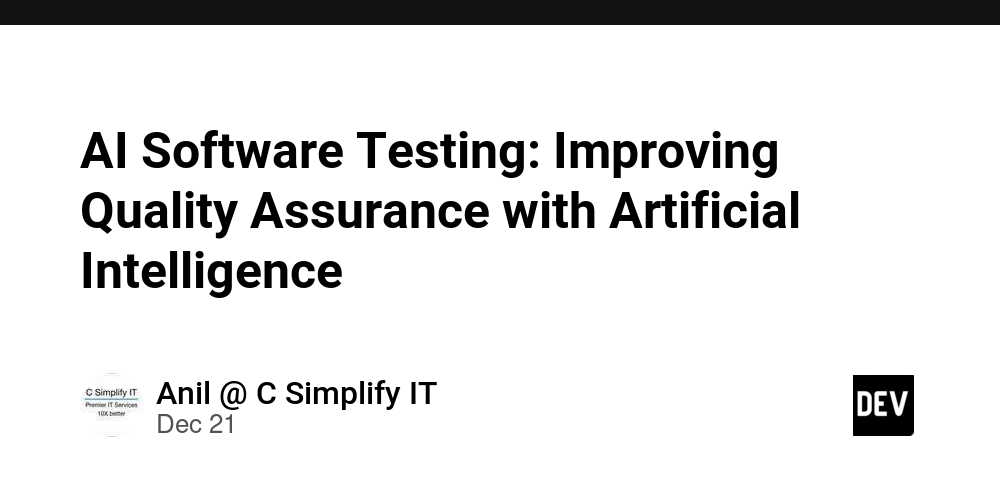Software testing has undergone a significant transformation, evolving from manual processes to advanced artificial intelligence-driven technologies. In the early days of software development, testing was a manual, labor-intensive activity that required testers to execute test cases and carefully identify defects. As software complexity increases, the need for efficiency has led to the creation of automated testing tools to speed up the process and improve accuracy.
The introduction of artificial intelligence (AI) and machine learning (ML) has further revolutionized software testing. According to the 2024 Currents research report, which surveyed technology founders, executives and employees, 80% believe that artificial intelligence and machine learning tools allow them to focus on more critical tasks. This article explores artificial intelligence software testing, its benefits, challenges, strategies, and the role of tools like GenQE.ai in enhancing test results.
What is artificial intelligence software testing?
Artificial intelligence software testing integrates artificial intelligence and machine learning algorithms into the software testing life cycle. Unlike traditional approaches that rely heavily on manual labor and predefined scripts, AI testing leverages intelligent automation to optimize every aspect of the testing process.
AI tools such as GenQE.ai can analyze large amounts of test data, generate optimized test cases, and detect patterns that indicate potential defects. These tools dynamically adapt to software changes, ensuring continuous testing with minimal manual intervention—a key advantage in agile and DevOps environments where rapid iteration and continuous integration are the norm.
Benefits of artificial intelligence software testing
Extensive test coverage
AI-driven tools enhance test coverage by automatically generating diverse and comprehensive test scenarios. Tools like GenQE.ai can analyze user behavior, historical defect data, and software requirements to generate test cases that cover a wide range of scenarios, including edge use cases that human testers often miss.
For example, using GenQE.ai, organizations can simulate various user interactions, device configurations and network conditions. This comprehensive coverage reduces production risks and ensures a higher quality user experience.
Faster test execution
Artificial intelligence tools speed up testing by automating repetitive tasks and optimizing processes. Tools like GenQE.ai can execute tests across multiple environments, including desktop and mobile browsers, enabling continuous testing and fast feedback.
For example, development teams using GenQE.ai can trigger real-time test execution when new code is submitted. This rapid feedback loop supports continuous integration/continuous deployment (CI/CD) to maintain high software quality with faster release cycles.
Improve test accuracy
AI-driven tools use predictive analytics to identify potential defects and analyze historical test data to reduce human error. For example, GenQE.ai can predict high-risk areas of software and focus testing efforts accordingly, resulting in more accurate and reliable defect detection.
cost saving
Automated software testing reduces the need for extensive manual intervention, thereby significantly reducing costs. GenQE.ai automates regression testing and efficiently executes complex test suites, minimizing resource requirements and delivering higher ROI.
Early fault detection
Artificial intelligence tools continuously monitor software for abnormalities, enabling early fault detection. Self-healing frameworks like GenQE.ai adapt test scripts based on software changes, ensuring tests remain valid throughout the development lifecycle.
For example, GenQE.ai can monitor e-commerce platforms to detect real-time issues such as transaction anomalies or performance bottlenecks. Early detection helps resolve problems before they impact users, improving reliability and reducing costs.
Efficient test maintenance
In traditional testing, maintaining test scripts is a labor-intensive task, especially when the software is frequently updated. Artificial intelligence tools like GenQE.ai simplify this process by automatically updating test cases to reflect software changes, reducing manual work and ensuring an up-to-date testing framework.
Challenges of artificial intelligence software testing
High initial setup costs
Implementing an AI testing tool like GenQE.ai requires an upfront investment in technology and training. Organizations can mitigate this problem by starting with high-priority areas where AI can bring immediate benefits and gradually expanding as ROI becomes clear.
complex integration
Integrating AI tools into existing workflows can be complex. Compatibility issues with legacy systems may arise. Tools like GenQE.ai are designed to integrate seamlessly with popular frameworks, easing the transition. A phased approach (starting with non-critical applications) minimizes disruption.
Limited expertise in AI
Teams new to AI may face a steep learning curve. Training programs and collaboration with AI experts can accelerate the adoption of tools like GenQE.ai, ensuring smooth implementation and effective use.
Quality management of test cases generated by AI
Artificial intelligence tools may generate test cases that require refinement. By combining feedback loops and manual review, tools like GenQE.ai improve the relevance and accuracy of test scenarios, balancing automation with manual oversight.
Data security and privacy issues
Artificial intelligence testing involves processing large amounts of sensitive data, raising privacy concerns. GenQE.ai prioritizes data security, providing encryption, access control, and compliance with industry standards to protect test data. Regular review and compliance with best practices can further reduce risk.
in conclusion
AI software testing powered by tools like GenQE.ai represents the future of quality assurance. By integrating artificial intelligence and machine learning, organizations can achieve broad test coverage, faster execution, greater accuracy, and significant cost savings. Address challenges through strategic planning, phased implementation, and strong security measures to ensure a successful transition to AI-driven testing.
As software development continues to evolve, employing artificial intelligence in testing is critical to quickly delivering high-quality, reliable applications.
